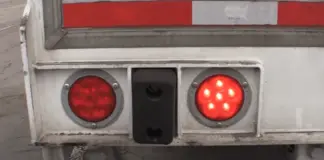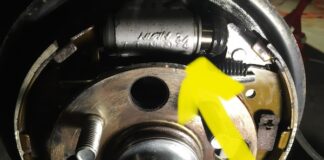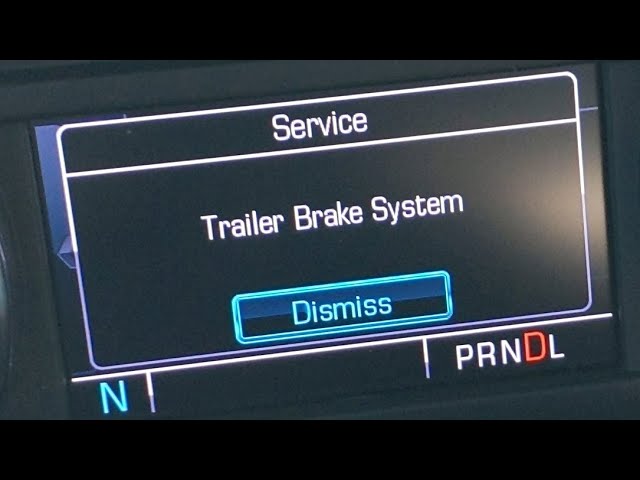Seeing a “Service Trailer Brake System” alert on your Silverado’s dashboard can be a hassle. Learning about common issues, like loose wires or a faulty controller, can help you fix the problem quickly. This guide offers easy tips to troubleshoot and potentially save on repair costs. Keep reading to find simple steps to get your truck towing smoothly again.
What Is the Trailer Brake System on Your Silverado?
The trailer brake system on your Silverado is a safety feature designed to make towing safer. It ensures your trailer slows down or stops when you press the truck’s brake pedal. Knowing how this system works can make towing easier and more reliable.
Key Parts of the Trailer Brake System
The trailer brake system in your Silverado has a few important parts. The brake controller lets you adjust how much braking power goes to the trailer.
Sensors keep track of your truck’s speed and how hard you’re pressing the brake pedal.
Relays send signals from the controller to the trailer’s brakes. Many Silverados have an integrated brake controller built into the dashboard for easy control and monitoring.
The master brake cylinder creates the hydraulic pressure needed to make the brakes work. Understanding these parts helps you spot and fix issues.
How Does the System Work?
When you hit the brake pedal, the integrated brake controller gets a signal. It tells the controller to activate, which then talks to the relay. The relay makes sure the trailer’s brakes kick in properly.
Sensors figure out how fast you’re going and adjust the trailer’s braking power. The master brake cylinder provides the hydraulic push to make it all happen.
If something goes wrong, you might see the “Service Trailer Brake System” warning. Knowing this process can help you figure out what’s broken and keep your towing safe.
Frequent Problems and Warning Signs
The “Service Trailer Brake System” alert can pop up for various reasons. You might also notice the ABS light turning on or get error messages even when no trailer is hooked up. Recognizing these issues can help you find the root cause and fix it.
What Does the ‘Service Trailer Brake System’ Warning Mean?
This warning often points to issues with the wiring or connections between your truck and trailer. Loose, damaged, or rusty wires can cause this error. Regularly checking your electrical connections ensures they’re tight and clean.
Another possible culprit is the integrated brake controller. It might be glitching or need a reset. Check your truck’s manual or ask a mechanic for help testing or replacing faulty parts.
Why Do I Get a ‘No Trailer’ Error or ABS Light?
A “No Trailer” error can be annoying, especially if your trailer is connected. This often happens when the trailer detection system fails, possibly due to bad wiring or a loose plug. A broken sensor could also be to blame.
If the ABS light comes on, it might mean there’s an issue with the brake system, like a faulty brake light switch or damaged wires. Checking all connections and sensors can often clear up these problems.
Handling False Alarms
Random warning sounds, like chimes when backing up, can drive you nuts. These false alarms often come from issues in the trailer’s brake system. A faulty trailer tow relay or a short circuit could be the cause. Replacing the relay might fix it.
Blown fuses, such as the 30A LP JCase, can also trigger false warnings. Regularly checking and replacing these parts can prevent annoying alerts. If problems persist, a failed solid-state relay might need reprogramming or replacement.
How to Service Your Trailer Brake System
Maintaining your trailer brake system keeps your towing safe and hassle-free. This step-by-step guide covers checking sensors, fixing wiring, and repairing the brake controller.
Inspecting Sensors and Relays
Start by checking the sensors and relays, which are vital for sending brake signals. If your trailer brakes aren’t working right, a bad sensor could be the issue.
- Make sure all connections are secure and free of rust. Water can damage connections, so keep them dry.
- Use a multimeter to test sensors and relays for proper voltage.
- Replace any broken parts immediately to keep your brakes working safely. Don’t forget to check fuses, as they can blow and cause issues.
Fixing Trailer Wiring Problems
Wiring issues are a common reason for trailer brake problems. Damaged or corroded wires can stop electricity from reaching the brakes.
- Check all wires connected to the trailer brakes.
- Look for frayed, cracked, or worn wires.
- Test the wires with a continuity tester to ensure electricity flows properly.
- If you find damaged wires, replace them and use waterproof connectors to seal the connections.
Repairing the Brake Controller
The brake controller syncs your trailer’s brakes with your truck’s. If it fails, your trailer might not brake properly.
- Test the controller settings with the trailer connected. The brakes should respond smoothly when you press the pedal.
- Check your truck’s manual to see if the controller is working correctly.
- If it’s not working, try resetting or replacing the controller. Make sure it’s set for your trailer’s weight.
Following these steps will keep your trailer brake system in great shape for your next towing trip.
Tips to Prevent Trailer Brake Issues
Regular maintenance of your Silverado’s trailer brake system can stop problems before they start. Focus on routine checks, cleaning, and replacing worn parts for safe and smooth towing.
Routine Checks and Cleaning
Inspect your trailer brake system every few months. Look for rust on connections or metal parts, as moisture can cause damage. Clean these areas with a soft brush and a safe cleaning solution.
Check sensors and wiring for loose or damaged connections. Also, inspect the ABS system to ensure it’s free of dirt or debris.
Regular cleaning and inspections catch small issues early, keeping your brakes reliable.
Proactive Part Replacements
Swap out worn parts like fuses or brake pads before they fail. This keeps your trailer brake system stable. Test the brakes regularly to ensure they work smoothly with your truck.
Pay attention to the trailer brake module. Odd noises or changes in braking power can signal it’s time for a replacement. Staying proactive reduces surprises on the road.
By staying on top of maintenance, you’ll tow with confidence and avoid costly repairs.







